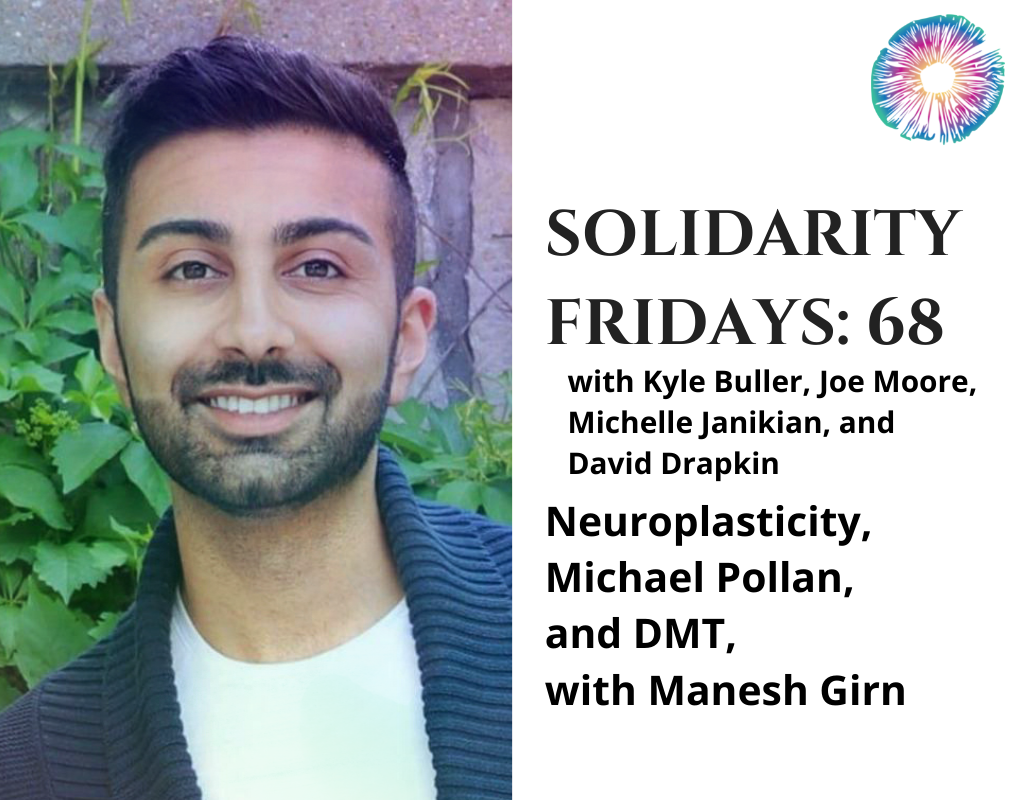
Research
PTSF68 – Neuroplasticity, Michael Pollan, and DMT, with Manesh Girn
July 16, 2021
In this week’s Solidarity Fridays episode, Joe, Michelle, Kyle, and David are joined by past Navigating Psychedelics student and Ph.D. candidate in Neuroscience at McGill University, Manesh Girn.

In this week’s Solidarity Fridays episode, Joe, Michelle, Kyle, and David are joined by past Navigating Psychedelics student and Ph.D. candidate in Neuroscience at McGill University, Manesh Girn.
Everyone was excited but also extremely confused about last week’s story on psilocybin inducing “rapid and persistent” growth in the dendritic spines of mice, so we thought it made a lot of sense to bring a friend on the show who understands this stuff and can explain it to those of us who don’t regularly study neuroscience. What are dendritic spines? What does “learned helplessness” mean? How about elevated excitatory neurotransmission? What is a “head twitch response”? Ketanserin? Girn thankfully explains it all and stays with the team for this week’s news.
They first review Michael Pollan’s recent op-ed in the New York Times titled, “How Should We Do Drugs Now?”, which unfortunately focused on medical and Indigenous-use as the only reasonable paths forward, and gets everyone questioning why drug use for pleasure isn’t viewed as therapeutic, where our responsibility lies as members of the media when it comes to drug safety, and how harm reduction and safety measures can increase stigma around drug use. They also talk about Senate Bill 519’s progress and the wrong turn its committee recently took in removing social-sharing from the bill, the normalization of DMT use (and the idea of “needing an escape”), and how Michelle is trying to meet aliens.
Notable Quotes
“In humans, how I think about it, is that the neuroplasticity just gives your brain more resources to encode the insights and the experiences that you go through. So you have this radical experience where you might have insight into your patterns, into your traumas, etc., but then in order to last in a lasting way in your brain, you need some degree of neuroplasticity and it’s kind of giving you the push there. I think they both synergize with each other. I think if you have this boost in neuroplasticity, you can really exploit and leverage it with conscious intention.” -Manesh
“I think a lot of folks are creating their own rituals which do ground them, and they don’t have to be appropriations of Indigenous culture or appropriations of the medical model. I think, for most folks, they’re kind of somewhere in the middle. I know my rituals look nothing like either of those approaches. …I just feel like this conversation is often forgetting what real people in real time are doing.” -Michelle
“People go to festivals or concerts and use these substances or use them in situations where there’s more social bonding happening, and doing it for that more pleasure [purpose]; why is that wrong? I’m just even thinking in terms of therapy. It’s like, ‘Oh, if we’re not digging into your biographical history or trauma, then what are we doing here?’ Can we bring pleasure into our human experience at times without feeling so guilty or some sort of shame around it?” -Kyle
“I think 1/7th of the world’s population in 20 to 40 years will be a permanent migrant class with no real home. We’ve got some work to do. Do we really want to keep locking people up for cocaine when we could be solving real problems here? …How dangerous is MDMA? It’s about as dangerous as riding a horse. Why do we care so much? LSD and psilocybin? Safest drugs ever, according to David Nutt. What are we doing?” -Joe
Links
Youtube.com: The Psychedelic Scientist
Instagram: @thepsychedelicscientist
Knowingneurons.com: The Epigenetic Legacy of Trauma (more info about intergenerational trauma and the methylation of DNA)
Medicalnewstoday.com: Can we boost plasticity without the ‘trip’? (more info about ketanserin)
Nytimes.com: Opinion: How Should We Do Drugs Now?
This Is Your Mind on Plants, by Michael Pollan
Bbc.com: Four-day week ‘an overwhelming success’ in Iceland
Vice.com: Tripping On Your Lunch Break: Inside the Rise of Casual DMT Use
The Brotherhood of the Screaming Abyss, by Dennis J. McKenna
Psychedelics Today: MDMA – Confessions of an Underground MDMA Therapist
About Manesh Girn
 Manesh is a Ph.D. candidate in Neuroscience at McGill University and has been lead or co-author on over a dozen scientific publications and book chapters on topics including psychedelics, meditation, mind-wandering, and the default-mode network. His PhD dissertation focuses on the default-mode network and he is also conducting research on the brain mechanisms underlying LSD, psilocybin, and DMT in collaboration with Dr. Robin Carhart-Harris and others from the Imperial College London Center for Psychedelic Research. In his free time, he also runs a YouTube channel, The Psychedelic Scientist, where he discusses the latest findings in psychedelic science in an easy to understand, but non-superficial form.
Manesh is a Ph.D. candidate in Neuroscience at McGill University and has been lead or co-author on over a dozen scientific publications and book chapters on topics including psychedelics, meditation, mind-wandering, and the default-mode network. His PhD dissertation focuses on the default-mode network and he is also conducting research on the brain mechanisms underlying LSD, psilocybin, and DMT in collaboration with Dr. Robin Carhart-Harris and others from the Imperial College London Center for Psychedelic Research. In his free time, he also runs a YouTube channel, The Psychedelic Scientist, where he discusses the latest findings in psychedelic science in an easy to understand, but non-superficial form.
Support the show!
- Patreon
- Leave us a review on Facebook or iTunes
- Share us with your friends
- Join our Facebook group – Psychedelics Today group – Find the others and create community.



